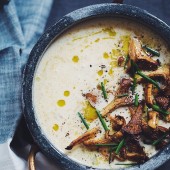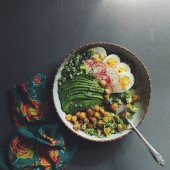I get this question all the time – from friends, family, people who read the blog: “How do you have time for all of this cooking?”
And it’s true – time is a precious commodity in our home, just like it is for anyone who has kids, a full time job, or both. Between work, juggling my kids’ drop offs and pick ups, managing their afterschool activities and doctors’ appointments, there’s not a lot of time left for cooking.
But I’ve figured out a few strategies that help me cook healthy, creative food at home despite this time pressure.
So here they are – my top 5 habits for time-pressured cooks:
1. Wash and bag your greens the day you bring them home
It takes time to save time. Might be counter intuitive, but spending 20 minutes putting away your groceries properly will help you in the long run. As soon as I get home from the grocery store (or later that evening if I’m strapped for time), I wash and bag any greens – just rinse in the colander, and stick them in separate Ziploc bags with a dry paper towel. The benefit is that it extends the life of your produce, and makes your greens readily available for a quick meal. No chopping wet herbs, no limp greens in your cooler. With a few minutes of effort, you’ve saved yourself a whole host of headaches.
Good for: Herbs, lettuces, and any dark, leafy greens such as Kale or Chard.
2. Cook longer cooking ingredients when you have time
This happens more in the fall, when we gravitate towards the root vegetables, winter squashes, and other slow cooking vegetables. And they’re often the last thing you want to cook (or have time to cook) at the end of the day. The trick is to do the cooking the night before. Or even 2 days before. I often prep and cook these types of vegetables without any plan for how I’m going to use them. I just throw them in the oven at a time that’s convenient for me, and they’re cooked and ready to go whenever I need them.
Ideas: Cube and roast butternut squash for salads and side dishes, roast whole sweet potatoes for soups or purees, trim, halve and roast Brussels sprouts, roast a bunch of chopped carrots, roast whole beets in foil, throw beans in the slow cooker for a day. Many of these prepped ingredients can be used cold, and if you want them hot, just sautee them for a minute or two or warm them in the microwave.
3. Make double the amount
If you’re cooking a specific ingredient that could have multiple uses, just double it. And I don’t mean double the recipe – I hate eating the same dish three nights in a row. But double the ingredients that are easy to repurpose. This week I made a stuffing with kale and shitake mushrooms. I doubled the kale so that I’d have extra on hand for future dishes. The remainder is now in my fridge, bagged and ready to use for an omlette, pasta, fried rice or just about anything that calls for greens.
Good for: Double cook your pasta and rice – toss leftovers with a few vegetables and cheese and bake them in the oven for a quick weeknight meal; leftover rice is perfect for fried rice; extra vegetables like sautéed onions, kale, and mushrooms can be added to salads, soups, casseroles; and cooked meats like ground beef, or shredded chicken make the perfect filling for stuffed vegetables (peppers and zucchini are my favorite), or play a starring role in quick fix foods like tacos and burritos.
4. Say no to recipes
Up until recently, and I’ll be totally honest here, I felt that my food wouldn’t taste as good if I cooked it without a recipe. Recipes can be great if you’re learning to cook, but cooking intuitively also its benefits, even for those who are novices. For one, cooking is faster without having to keep checking the ingredients and directions. Even as an accomplished home cook, when I follow a recipe, I’ll check it upwards of 10-15 times as I’m cooking the dish. That is a HUGE time sink.
But the other important benefit to cooking without a recipe is that it forces you to use your cooking instinct, your gut feel. It becomes a creative process rather than a mechanical process and you’ll actually become a more intuitive cook along the way. So save yourself time, and become a smarter cook by ditching the recipes, at least once a week. My only regret is that I didn’t try this earlier in my cooking career.
5. Use your scraps
I hate to waste food. Hate it, hate it, hate it. I spend good money on high quality, mostly organic ingredients, and it pains me to see anything go into the garbage. Food that’s been in the fridge, past its prime, is another story. But there is plenty of good food that people regularly throw away that could have a useful second life.
Take for instance the lowly baguette. We buy them fresh, forget to use them (or don’t use the whole amount) and the next day they’re hard. Time to throw them into the trash? Not in our home. Day old – even 2-day old baguettes are cubed, drizzled with olive oil, salt and black pepper and tossed into the oven. They make great salad croutons or toppers for soups. You can likewise use them in anything bread-based, like stuffing, bread pudding, or panzanella. I also like to throw leftover bread in the food processor, bag the crumbs, and keep it in my freezer for topping a mac ‘n cheese or making things like meatballs. Prepping stale bread like this can be done in just a few minutes after the kids go down, and you have a high quality ingredient ready and waiting for its next use.
And don’t limit it to bread. So many scraps are usable: chicken bones make a great stock; leftover mushy risotto can be made into crispy risotto balls, roasted vegetables are made soup.
See your forlorn throwaways as opportunities. Not only does it save you time – fewer trips to the grocery store, and give you a host of ready-to-go ingredients – but it also makes for a happier cooking experience when you’re not constantly throwing good food away.
The fallacy about cooking is that everything needs to be made from scratch for every meal. If you’re smart about your work in the kitchen – doing little tasks consistently over time, you’re less likely to face the huge hurdle of making the entire meal at 6PM when you get home from a busy day of work and activities. So yes, you too, can make some great looking meals on weeknights.
If there are tips for fast and efficient cooking that you use on a regular basis, let me know in the comments below. I’d love to hear from you.
Happy cooking everyone!








Great advice!
Thanks ML!
great tips! i wish i had your creativity!
Thanks so much – hopefully they’re useful. Creativity comes with practice, trust me I was the least creative cook for years before I got comfortable in the kitchen.
Great tips that I will definitely use. I, too, can’t stand throwing out good food.
The worst! I die a silent death every time I see good food getting thrown out.
Excellent tips. Thanks Jessica.
You’re welcome, glad they’re helpful!
Love this. Gotta get better about prepping my veggies right away. Right now I have a container of greens just sitting unused and about to go bad….
I wrote this post with you guys in mind, didn’t realize that I did so much prep that most people don’t do. I’ve been doing it this way for so long : )
Having leftover is my savior. I’m just cooking for myself, but if I have the time, I cook three or four portions so I always have something ready to eat in the fridge.
Smart, I sometimes cook for myself if the kids are eating something different and my husband is traveling & do the same – lots and lots of leftovers, but each night gets a different spin. Hope you’re enjoying the blogging process, your blog is great!
Great article, I do many of these. Also making a meal plan and only buying the produce you are going to use saves money and waste. I also tend to “learn’ recipes on the weekends when I have more time, so when I do them in the week I don’t have to follow the recipe.
Thanks Jill! I would love to meal plan but never have my act together in time : ) Will definitely have to give this a try. And great idea about learning recipes on the weekends. Thanks for your great tips! Will share them on my Facebook page.
I love the idea of washing the veggies before putting them in the fridge. Didn’t really think of it, I wonder why?
Thanks for the great tips, Jessica!
Thanks Delia! Glad to be finally giving you some good tips for a change 🙂